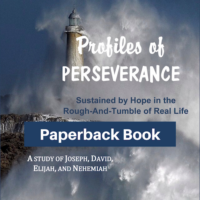Joseph: God Works It for Good • Genesis 42-50

AI was not used to generate this post.
“Why, God?” That question always comes up when something bad happens. We want reasons why we have to endure something painful. Most of the time, we cannot see the reason. But our God asks us to trust Him. And perseverance is an integral part of that trust. This is post #5 in the Old Testament Men blog series. In the last two articles, we learned about perseverance from the life of Joseph. We saw how he experienced rejection and loss and lots of waiting. But he still functioned well through all of that because he recognized that God was with him through all of that too. In this post, we will see from Joseph’s experience what it means when we say that God works it out for our good.
Key Takeaways
- Joseph’s journey illustrates how God works it for good, even through suffering and betrayal.
- Joseph’s ability to endure suffering deeply impacted his family reunion, leading to forgiveness and restoration.
- God allows human freedom, which means evil actions can occur, but He can weave them into a greater purpose.
- When facing evil, avoid minimizing the pain or blaming God; instead, emphasize His goodness and love.
- Trust in God’s sovereignty and His promise that He works every situation for the good of those who trust Him.
Listen to this post as a similar podcast from our Profiles of Perseverance Bible Study covering the lives of Joseph, David, Elijah, and Nehemiah.
The Reward for Functioning Well
Joseph endured a long time of suffering and waiting for freedom. Then, it is over! He’s not only released from his humble prison but exalted to the position of prime minister of Egypt, second only to the king. What a change of situation! Joseph continued to function well and glorify God in his work.
One day, a group of desperate men came to buy food from Egypt so they could feed their families. Standing in front of Joseph, they have no idea he is their brother. But he recognizes them.
Now Joseph was the governor of the land, the person who sold grain to all its people. So when Joseph’s brothers arrived, they bowed down to him with their faces to the ground. As soon as Joseph saw his brothers, he recognized them, (Genesis 42:6-7)
The brothers are in his hands. This encounter with the ones who rejected him and stole years of family life from him stir up sadness in his heart. He remembers his distress as he had pleaded for his life all those years ago. He weeps privately (Genesis 42:24). Functioning well did not eliminate his emotions. He feels the pain all over again. How will he move beyond the pain?
Moving Beyond the Pain
The reunion
Joseph has learned much about managing people over the years. He puts that to work in relating to his brothers. We don’t know the reasons Joseph had for the actions he took with them—keeping Simeon and Benjamin captive and hiding the silver in their bags.
Whatever Joseph’s reasons, his actions gave him time to prepare his own heart. Then, he could respond rightly to his brothers when he revealed himself.
Then Joseph said to his brothers, “Come close to me.” When they had done so, he said, “I am your brother Joseph, the one you sold into Egypt! And now, do not be distressed and do not be angry with yourselves for selling me here, because it was to save lives that God sent me ahead of you. For two years now there has been famine in the land, and for the next five years there will be no plowing and reaping. But God sent me ahead of you to preserve for you a remnant on earth and to save your lives by a great deliverance. (Genesis 45:4-7)
The family reunion was a time of forgiveness and celebration. Joseph showered his family with gifts galore—all of them, even those who mistreated him. Land, homes, jobs, food, and security. Joseph saw a greater purpose in the tragic circumstances of his life than just for himself.
The right perspective
After Jacob died and the brothers were sure Joseph would now destroy them, his simple response that has resounded for almost 4000 years is this,
“Don’t be afraid. Am I in the place of God? As for you, you meant to harm me, but God intended it for a good purpose, so he could preserve the lives of many people, as you can see this day.” (Genesis 50:20, NET)
What his brothers did to him was horrible. It was evil. No doubt about it. But Joseph had a choice. He could follow the pattern of anger, despair, and self-pity. Or he could trust God to do something on his behalf that would be good for him and bring God the glory He deserves. Joseph saw that the good God accomplished was the saving of many lives.
The purpose of God
God intended what Joseph experienced for a good purpose. The Hebrew root word used there means “to weave together.” God wove it together—worked it together—for a good purpose. Yes. Then, our minds go right away to Romans 8:28,
And we know that in all things God works for the good of those who love him, who have been called according to his purpose. (Romans 8:28)
The fact that God can work things together for good does not mean that those things are good. God is sovereign. And in His sovereignty, God allows human freedom including the freedom to do evil. That doesn’t make it is okay to do evil. Joseph’s brothers did evil to him. God did not do the evil.
God’s plan all along was to get Abraham’s descendants to Egypt where they would live for 400 years. He told Abraham about that plan in Genesis chapter 15, not specifically mentioning Egypt. But Egypt at that time was the biggest, most prosperous, and closest country to Canaan.
As the sun was setting, Abram fell into a deep sleep, and a thick and dreadful darkness came over him. Then the Lord said to him, “Know for certain that for four hundred years your descendants will be strangers in a country not their own and that they will be enslaved and mistreated there. But I will punish the nation they serve as slaves, and afterward they will come out with great possessions. You, however, will go to your ancestors in peace and be buried at a good old age. In the fourth generation your descendants will come back here, for the sin of the Amorites has not yet reached its full measure.” (Genesis 15:12-15)
God allowed Joseph’s brothers to sell him into slavery. But God didn’t do the evil. The brothers did. God took that situation and Joseph’s faith walk with Him and wove it to bring about His plan to save lives. God worked it for good—just like a weaver does.
Why Doesn’t God Stop Evil?
Restraining evil now
“Why, God?” The question that always comes up when something evil happens. God does not do the evil. Evil humans do it. The next question is usually, “Why doesn’t God stop it?”
Now you are at the bigger questions, “Why does God let people do evil? Why doesn’t He stop it if He is capable of doing so?”
The true answer is that God does stop evil all the time. He stops more evil than we will ever know. Every day He is stopping evil. Just look at the book of Revelation chapters 5-18 to see what life on this planet looks like when God takes His restraining hand off of evil.
Human freedom
You may then ask, “Why doesn’t He stop all evil?” To stop all evil would mean to stop all human freedom. The Bible teaches us that God takes our freedom and responsibility far more seriously than we do. Are you willing to give up your freedom? I kinda like mine.
People get very confused in their thinking. We want to have it both ways. We want to be free and responsible except when bad things happen. Then when something bad happens, we want God to be responsible for letting it happen. We blame God. Isn’t that true?
You see and hear this every day every time there is a tragedy. God lets humans be free and responsible for what they do. We humans can’t have it both ways. Either human beings are free and responsible for what we do, or we are not free and responsible for what we do. We can’t blame God for humans doing wrong. The gift of human freedom allows for evil choices.
You don’t have to have an answer for all bad things happening. In this world, all will not turn out well. When we are with Christ, we will have the whole story. Understanding this leads to right thinking in evil situations and helps us to avoid some wrong answers to the question, “Why, God?”
We need to know what to say and do when evil things happen. So, I will share with you a few cautions of what to say and not to say when evil things happen, when humans choose to do wrong and hurt others.
What to Say and Not Say When Evil Things Happen
Caution #1: Don’t minimize the evil or the hurt.
Don’t quote Romans 8:28 and think that will bring comfort for the hurt.
One of my pastors gave me some wisdom about what to say. We can say to the victim of any violent incident, “That was gross, black, terrible, straight from the pits of hell, and those people are responsible for what they did. But God is bigger and greater. And if you will trust Him, then one day, whether in this life or the next, you will see how He fulfilled that promise to work that bad thing into something good. You choose what to do in the meantime. You can respond by faith now when things aren’t ideal, or you can keep being the bitter victim.”
Choosing the latter only contributes to the feeling of helplessness. It does not contribute to healing and hope. The Bible teaches us that it is far better to trust what God is doing in what He allows or doesn’t allow to happen. That is hard to do because we want Him to fix it now.
Caution #2: Don’t say, “I’m sure God has a plan or purpose for this.”
Don’t say that. Those words are enough to make people blow up at God. Delete that phrase from your file of “words to give comfort in times of trouble.” You can think it. And you know God will work out a purpose for allowing that to happen. But God didn’t cause that evil thing to happen. So don’t encourage people to be angry at God.
We think in “churchy” phrases and often throw these at others, forgetting where they really are.
- Don’t say: “I’m sure there’s a reason why this happened” (because that puts the emphasis on God and why did God did this).
- A better response would be this, “I don’t know why things happen in the world. I do know that God is good, that He is loving, and that you can go to Him for comfort. He will strengthen and help you. I know He is not finished with you, and He has a future for you.” Those things are absolutely true.
Caution #3: Don’t say, “God’s in control.”
So when a madman is killing people and you say “but God’s in control,” you are making God responsible for some evil person’s actions. Don’t say it!
The truth is that God is sovereign over all of human history and what He allows or doesn’t allow humans to do. But, the evil is still evil. God is not doing it. The key is to trust God whether you understand or not. And you must believe that God works it eventually for good for someone. You might not recognize it being for you.
Caution #4: Don’t encourage revenge.
Taking revenge is not ours to do. Revenge has no place in the gospel or in a Christian’s life. In the New Testament, we are told not to repay anyone evil for evil. Do not take revenge, but leave room for God to enact justice. Believe that He will do it. Justice will be done—whether in this life through the legal system or after death. But for now, Jesus calls us as individual believers to respond differently from this world.
Our instruction in the meantime is this from Romans 12,
If your enemy is hungry, feed him; if he is thirsty, give him a drink; … Do not be overcome by evil, but overcome evil with good. (Romans 12:20-21)
When we take revenge, that is being overcome by evil. So we must trust God to avenge the wrongs done to us in His time.
Truths to Remember While Waiting for God to Work
Here are four truths to remember while waiting for God to work all things for good:
Truth #1: We live in a fallen, wicked, cursed world with suffering, evil and death.
We live in a war zone, both physically and spiritually. It is a broken world.
Truth #2: God has chosen from the beginning to give human beings the freedom to act.
When someone asks, “Why did this wicked thing happen?” Answer with, “An evil human being did this.” Don’t discount evil.
Truth #3: God promises to accomplish a greater good in and for all people who trust in Him.
For those God foreknew he also predestined to be conformed to the image of his Son, that he might be the firstborn among many brothers and sisters. (Romans 8:29)
Our God is working to conform us to the image of His Son. Suffering is one of His tools to do that. The whole New Testament teaches that.
Truth #4: We live in the last days of the old creation that will not be fixed until Jesus returns.
Our great and powerful God will one day wrap up history and fix it. We live in the hope of this happening in our future. In the meantime, humans are free to do what they want to do.
The World Is Not Always Good, But God Is.
To someone who is a casualty of this wicked world (cancer, death, rape, murder), try giving them this counsel:
“I don’t know if there is any answer to this. But I do know that Jesus said, ‘Come to Me, and I will give you rest.’ I know for a fact that if you go to Jesus Christ today, you will find comfort and rest from anxiety. He can fulfill that promise. The world is not always good, but God is always good. That’s why you can trust Him.”
Are You Ready for Perseverance in Your Life?
As the Bible promises,
For whatever was written in earlier times was written for our instruction, that through perseverance and the encouragement of the Scriptures we might have hope. (Romans 15:4 NASB)
We can have hope because we have God with us. So, remember our lane markers for the race.
- Choose to persevere through every challenge.
- Count on God’s promise to give you hope.
- Let that hope sustain you through the rough-and-tumble of life.
- Celebrate the joyful reward.

Let Jesus satisfy your heart with hope as you persevere through everyday life.
Read all the articles in our Old Testament Men series. In the next post, we will begin to look at how David learned perseverance in his life.
All of the above information is covered in the Profiles of Perseverance Bible Study covering the lives of Joseph, David, Elijah, and Nehemiah.
AI was not used to generate this post.


